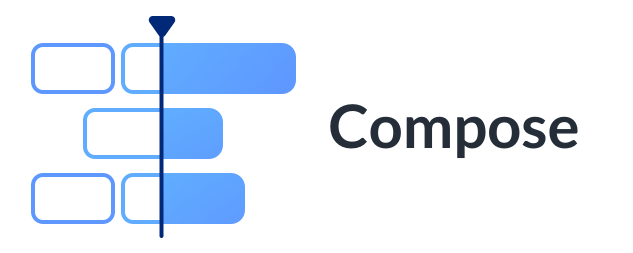alteryx / Compose
Programming Languages
Projects that are alternatives of or similar to Compose
"Build better training examples in a fraction of the time."
Compose is a machine learning tool for automated prediction engineering. It allows you to structure prediction problems and generate labels for supervised learning. An end user defines an outcome of interest by writing a labeling function, then runs a search to automatically extract training examples from historical data. Its result is then provided to Featuretools for automated feature engineering and subsequently to EvalML for automated machine learning. The workflow of an applied machine learning engineer then becomes:
By automating the early stage of the machine learning pipeline, our end user can easily define a task and solve it. See the documentation for more information.
Install
Compose is available on PyPI and Conda-forge for Python 3.6 or later.
pip
To install from PyPI, run the command:
pip install composeml
conda
To install from Conda-forge, run the command:
conda install -c conda-forge composeml
Example
Will a customer spend more than 300 in the next hour of transactions?
In this example, we automatically generate new training examples from a historical dataset of transactions.
import composeml as cp
df = cp.demos.load_transactions()
df = df[df.columns[:7]]
df.head()
| transaction_id | session_id | transaction_time | product_id | amount | customer_id | device |
|---|---|---|---|---|---|---|
| 298 | 1 | 2014-01-01 00:00:00 | 5 | 127.64 | 2 | desktop |
| 10 | 1 | 2014-01-01 00:09:45 | 5 | 57.39 | 2 | desktop |
| 495 | 1 | 2014-01-01 00:14:05 | 5 | 69.45 | 2 | desktop |
| 460 | 10 | 2014-01-01 02:33:50 | 5 | 123.19 | 2 | tablet |
| 302 | 10 | 2014-01-01 02:37:05 | 5 | 64.47 | 2 | tablet |
First, we represent the prediction problem with a labeling function and a label maker.
def total_spent(ds):
return ds['amount'].sum()
label_maker = cp.LabelMaker(
target_entity="customer_id",
time_index="transaction_time",
labeling_function=total_spent,
window_size="1h",
)
Then, we run a search to automatically generate the training examples.
label_times = label_maker.search(
df.sort_values('transaction_time'),
num_examples_per_instance=2,
minimum_data='2014-01-01',
drop_empty=False,
verbose=False,
)
label_times = label_times.threshold(300)
label_times.head()
| customer_id | time | total_spent |
|---|---|---|
| 1 | 2014-01-01 00:00:00 | True |
| 1 | 2014-01-01 01:00:00 | True |
| 2 | 2014-01-01 00:00:00 | False |
| 2 | 2014-01-01 01:00:00 | False |
| 3 | 2014-01-01 00:00:00 | False |
We now have labels that are ready to use in Featuretools to generate features.
Support
The Innovation Labs open source community is happy to provide support to users of Compose. Project support can be found in three places depending on the type of question:
- For usage questions, use Stack Overflow with the
composemltag. - For bugs, issues, or feature requests start a Github issue.
- For discussion regarding development on the core library, use Slack.
Citing Compose
Compose is built upon a newly defined part of the machine learning process — prediction engineering. If you use Compose, please consider citing this paper: James Max Kanter, Gillespie, Owen, Kalyan Veeramachaneni. Label, Segment,Featurize: a cross domain framework for prediction engineering. IEEE DSAA 2016.
BibTeX entry:
@inproceedings{kanter2016label,
title={Label, segment, featurize: a cross domain framework for prediction engineering},
author={Kanter, James Max and Gillespie, Owen and Veeramachaneni, Kalyan},
booktitle={2016 IEEE International Conference on Data Science and Advanced Analytics (DSAA)},
pages={430--439},
year={2016},
organization={IEEE}
}
Acknowledgements
The open source development has been supported in part by DARPA's Data driven discovery of models program (D3M).
Innovation Labs

Compose has been developed and open sourced by Innovation Labs. We developed Compose to enable flexible definition of the machine learning task. To see the other open source projects we're working on visit Innovation Labs.



